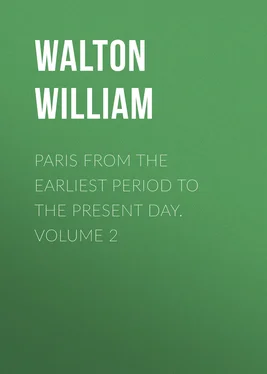William Walton - Paris from the Earliest Period to the Present Day. Volume 2
Здесь есть возможность читать онлайн «William Walton - Paris from the Earliest Period to the Present Day. Volume 2» — ознакомительный отрывок электронной книги совершенно бесплатно, а после прочтения отрывка купить полную версию. В некоторых случаях можно слушать аудио, скачать через торрент в формате fb2 и присутствует краткое содержание. Жанр: Путешествия и география, История, foreign_edu, foreign_antique, foreign_prose, на английском языке. Описание произведения, (предисловие) а так же отзывы посетителей доступны на портале библиотеки ЛибКат.
- Название:Paris from the Earliest Period to the Present Day. Volume 2
- Автор:
- Жанр:
- Год:неизвестен
- ISBN:нет данных
- Рейтинг книги:3 / 5. Голосов: 1
-
Избранное:Добавить в избранное
- Отзывы:
-
Ваша оценка:
- 60
- 1
- 2
- 3
- 4
- 5
Paris from the Earliest Period to the Present Day. Volume 2: краткое содержание, описание и аннотация
Предлагаем к чтению аннотацию, описание, краткое содержание или предисловие (зависит от того, что написал сам автор книги «Paris from the Earliest Period to the Present Day. Volume 2»). Если вы не нашли необходимую информацию о книге — напишите в комментариях, мы постараемся отыскать её.
Paris from the Earliest Period to the Present Day. Volume 2 — читать онлайн ознакомительный отрывок
Ниже представлен текст книги, разбитый по страницам. Система сохранения места последней прочитанной страницы, позволяет с удобством читать онлайн бесплатно книгу «Paris from the Earliest Period to the Present Day. Volume 2», без необходимости каждый раз заново искать на чём Вы остановились. Поставьте закладку, и сможете в любой момент перейти на страницу, на которой закончили чтение.
Интервал:
Закладка:
At this great king's death, he left France, says M. Duruy himself, "in a prodigious state of exhaustion. The State was ruined, and seemed to have no other resource than bankruptcy. Before the War of Succession, Vauban had already written: 'Nearly the tenth part of the people are reduced to beggary; of the nine other portions, five cannot give any alms to the mendicants, from whom they differ but slightly; three are very much distressed; the tenth part do not include more than one hundred thousand families, of which not ten thousand are comfortably situated.' This poverty became especially terrible in 1715, after that war in which it was necessary to borrow money at four hundred per cent., to create new imposts, to consume in advance the revenues of two years, and to raise the public debt to the sum of two milliards four hundred millions, which would make in our day nearly eight milliards!"
"Behold the cost of his glory," says M. Duruy elsewhere, "a public debt of more than two milliards four hundred millions, with a sum in the treasury of eight hundred thousand livres; an excessive scarcity of specie; commerce paralyzed; the nobility overwhelmed with debts, the least burdensome of which had been contracted at an interest of fifteen and twenty on the hundred; the magistrates, the rentiers , long deprived of the revenues owed them by the State; the peasants, in certain provinces, wanting for everything, even for straw on which to lie; those of our frontiers passing over to foreign countries; very many districts of our territory uncultivated and deserted." For the credit side of the account of this greatest of kings, the historian can cite the acquisition of two provinces, Flanders and Franche-Comté, certain cities, Strasbourg, Landau, Dunkerque, "so many victories, Europe defied, France so long preponderant, finally, the incomparable brilliancy of that court of Versailles and those marvels of the letters and the arts which have given to the seventeenth century the name of the siècle de Louis Quatorze!" Of the bigotry, ignorance, intolerance, and incredible and always uneasy vanity of the little soul of this great monarch the chroniclers of even his sycophants are full.
His political creed may be learned from this passage in his Mémoires : "The kings are absolute lords and have naturally the full and entire disposition of all property which is possessed as well by the churchmen as by the laymen, to use at all times, as judicious stewards, that is to say, according to the general need of their State. Everything which may be found within the limits of their States, of whatsoever nature it may be, appertains to them by the same title, and the coin which is in their strong-box and that which remains in the hands of their treasurers, and that which they permit to remain in the commerce of their peoples."
Consequently, the end of this reign of seventy-two years was "very different from its beginning. He received his kingdom powerful and preponderating abroad, tranquil and contented at home; he left it weakened, humiliated, discontented, impoverished, and already filled with the seeds of the Revolution." (Rœderer: Mémoires .)
For the administration of the government of the State, there were three great Councils, under the immediate direction of the king, who was his own prime minister. The Conseil d'en haut , to which he called the secretaries of State, and sometimes the princes of the blood, corresponded to the modern council of ministers in that it had the general direction of the great political affairs, with the additional function of judging appeals of the Conseil d'État , or Conseil du Roi . The latter, subordinate to the ministers but superior to the supreme courts, was the great administrative body of the kingdom and was composed of eighteen members. The Grand Conseil , which had been invested by Charles VIII with the judicial attributes up to that time appertaining to the Conseil du Roi, in order that the latter might remain a purely administrative body, sat in judgment on ecclesiastical matters, appeals to the higher courts, conflicts with parliamentary authority, etc.
For the administration of the city of Paris, and with the design of replacing the various seigneurial, ecclesiastic, and municipal authorities by one royal one, a decree was issued as early as 1674, in which all these justices, "and even that of our bailiwick of the palace, shall be reunited to the siège présidial de la prévosté et vicomté de Paris , held at the Châtelet, … so that in the future they shall never be separated from it, nor re-established, for any cause, or under any pretext whatsoever." A second seat of the prévôté and vicomté of Paris was established at the same time at the Châtelet with the same powers and prerogatives as the other,—the number of affairs being much too great for the cognizance of one jurisdiction. A supplemental decree, some months later, established the seat of the second in the abbey of Saint-Germain-des-Prés. This abolition of the divers administrations of justice by the seigneurs was greatly appreciated by the populace, and greatly resented by the deposed lords, secular and ecclesiastical. In 1687, a magistrate, Nicolas de la Reynie, was appointed as superintendent of the police of Paris, and he was succeeded, ten years later, by the Marquis d'Argenson,—these being the first two lieutenants de police . This police, in addition to maintaining the public order, exercised a surveillance over all printed and written matter—even searching the post and opening suspected letters in the cabinet noir , and making itself a servile instrument in the abuse of the lettres de cachet through which, as the president of the Cour des Aides, Malesherbes said to Louis XV in 1770: "no citizen has any assurance that his liberty may not at any moment be sacrificed to some personal vengeance."
An edict of 1705, recalling that, in 1690, la noblesse au premier degré had been bestowed upon the president, councillors, and other officers "of our Cour de Parlement de Paris ;" that in 1691 the same privileges had been granted to the presidents, councillors, and other officers "of our Cour des Aydes de Paris ;" in 1704, on the officers of the Chambre des Comptes , granted also this nobility to the presidents, treasurers-general of France, avocat, procureur, and greffier en chef of the bureau of finance. In the following year, the privileges of this nobility were granted to the échevins , the procureur, the greffier, and receiver of the city of Paris, and the prévôt of the merchants was given the title of chevalier. Following the ancient traditions of the French monarchy, the king preferred to see himself served by the men of the middle classes, rather than by the powerful lords, whose rôle was reduced to that of obsequious courtiers in his antechamber, but, "in working with the bourgeois, the grandson of Henri IV wished to remain always le roi des gentilshommes ."
In the person of Louis XV the most ignoble vices of a man were united to those of a king, but he had sufficient intelligence to foresee the calamity that was coming. "The thing will last at least as long as I do," he said, "my successor may get out of it the best way he can." And to Madame Pompadour is credited the famous saying: "After us, the deluge." When the minister Choiseul was disgraced, in 1770, half the nobles deserted the court to follow him to his estate of Chanteloup, near Amboise,—so much had the splendor of Versailles, that great glory of the reign of the Roi-Soleil , departed!
There were thirteen parlements and four provincial councils in France having sovereign jurisdiction in civil and criminal cases; the authority of the Parlement of Paris covered two-fifths of the kingdom. The chambres des comptes, the cours des aides, and the cours des monnaies judged all cases relating to the imposts, to the coinage, and to bullion. The grand conseil, the requêtes de l'Hôtel, the tribunal of the University of Paris, the capitaineries royales, etc., had each a special jurisdiction. Certain persons could only be judged by certain tribunals. In 1735, the Parlement having despatched its first president and several of its members to the king, then at Compiègne, to remonstrate with him, Louis XV informed them that he "forbade his Parlement to meet, to issue any decree, or to deliberate in any manner on the affairs of State; that they were to assemble only to receive his orders and to execute them, and that they had better not constrain him to make them feel the weight of his authority." In September of the same year, he summoned them to a bed of justice at Versailles, contrary to all precedent, and when they returned protesting, all the presidents and conseillers des enquêtes and requêtes were summarily banished to different cities in the kingdom by lettres de cachet. In 1753, the whole body was sent into exile, at Soissons, and to replace it the king created a chambre royale , which held its sittings at the Louvre, but which, though duly registered at the Châtelet au très exprès commandement du roi , was received with such contempt for its authority and such general levity that the members "became so well accustomed to it that they frequently assembled laughing, and made jests of their own decrees." The Parisians, who ridicule everything, declared that these members enjoyed themselves greatly at the masked ball during the Carnival, because none of them were recognized .
Читать дальшеИнтервал:
Закладка:
Похожие книги на «Paris from the Earliest Period to the Present Day. Volume 2»
Представляем Вашему вниманию похожие книги на «Paris from the Earliest Period to the Present Day. Volume 2» списком для выбора. Мы отобрали схожую по названию и смыслу литературу в надежде предоставить читателям больше вариантов отыскать новые, интересные, ещё непрочитанные произведения.
Обсуждение, отзывы о книге «Paris from the Earliest Period to the Present Day. Volume 2» и просто собственные мнения читателей. Оставьте ваши комментарии, напишите, что Вы думаете о произведении, его смысле или главных героях. Укажите что конкретно понравилось, а что нет, и почему Вы так считаете.












